Last Updated on December 8, 2024 by Owen McGab Enaohwo

Picture this: One of your experienced team members has just handed in a resignation letter. She’s a senior claims adjuster with over 25 years of experience, and over the years, she’s developed a unique way to handle complex claims more efficiently.
She knows exactly where to find missing documents, who to liaise with to speed up processes, and the best ways to respond to clients. Her expertise has been a huge asset. Thanks to her unique approach, your team can close claims faster.
But here’s the problem: all that legacy knowledge has never been documented anywhere. Her experience, go-to tricks, and proven methods—what we call “tribal knowledge”—are known only to her.
The good news? A tool like SweetProcess can help you capture and document this valuable tribal knowledge from each of your team members, ensuring it stays within the company.
Why don’t you sign up and explore its features now? No credit card is required, and you can cancel anytime. Click here to start for free.
What You’ll Learn In This Guide:
Common Tribal Knowledge Examples in an Organization
How to Capture Tribal Knowledge in the Workplace
How to Capture Your Company’s Tribal Knowledge Using SweetProcess
Benefits of Capturing Tribal Knowledge in a Company
Drawbacks of Tribal Knowledge in an Organization
What Leads to Tribal Knowledge in the Workplace?
Tribal Knowledge vs. Institutional Knowledge: How Do They Differ?
Tribal Knowledge vs. Other Company Knowledge
Is Tribal Knowledge Offensive?
Document and Manage Your Company’s Tribal Knowledge Using SweetProcess
What Is Tribal Knowledge?

Tribal knowledge is the valuable information, processes, and tricks employees have gathered through on-the-job experience.
Tribal knowledge isn’t formally documented or shared within the company. It could include shortcuts, best practices for completing tasks faster, proven ways to handle disgruntled customers, and much more.
Because tribal knowledge isn’t written down in any manual or guide, you risk losing this valuable information when experienced employees decide to move on.
When your experienced employees decide to leave, it can significantly impact your company. Your business could come to a standstill, and clients might even leave because a key team member is gone. Let’s face it: If your seasoned employees don’t document their knowledge, you can expect delays and errors. Plus, it could take weeks for new hires to get up to speed.
However, you can avoid this with standard operating procedure software like SweetProcess. It allows your experienced employees to document processes, procedures, and guides.
Moreover, SweetProcess makes it easy for teams to capture and share best practices, ensuring that common knowledge is always accessible within the organization. This way, your company can preserve its expertise, streamline workflows, and maintain high standards, regardless of who’s on the team.
Test out all the features of our tool for the next 14 days – entirely free.
Common Tribal Knowledge Examples in an Organization

Still not sure what tribal knowledge is? Let’s take a look at a few examples of tribal knowledge.
1. Internal Processes or Setup
Tribal knowledge related to internal processes often means that certain employees manage specific organizational tasks or workflows. These processes are typically passed down informally, with no documentation guiding new team members. As a result, newcomers may struggle to grasp how tasks should be executed fully and hesitate to ask for clarification if they forget a step.
Practical Example
In a marketing department, each team member is required to submit a weekly report. The report must cover all marketing channels and include the right metrics. While this may be mundane for an experienced marketer, it could be challenging for an intern unfamiliar with the reporting structure. However, if the report preparation steps were clearly documented, the intern would know which metrics to use for each channel.
How SweetProcess Can Solve This
SweetProcess can be used to document and standardize the reporting process, ensuring that everyone in the marketing department is on the same page. New employees, including interns, can easily access this documentation by creating a step-by-step guide for preparing reports. Even if seasoned employees move on, the process remains accessible and consistent.
2. Advantageous Relationships and Connections
Tribal knowledge also includes valuable relationships and connections within and outside the organization. These can be relationships with clients, vendors, or other key stakeholders known to specific team members. Once these employees leave, the valuable contacts they’ve built may go with them, leaving new hires at a disadvantage.
Practical Example
A senior buyer representative knows that a particular supplier offers discounts to loyal clients, but this unwritten information is never formally shared with newer team members. As a result, newer buyers may not capitalize on the opportunity to negotiate better deals with suppliers, missing out on potential savings.
How SweetProcess Can Solve This
SweetProcess lets you document and store information about relationships and connections with vendors, clients, and other stakeholders. You can create an internal knowledge base that includes contact details, communication preferences, and guidelines on interacting with key connections. By making this information accessible to all relevant team members, you ensure that the knowledge is shared and not lost when employees leave.
3. Trade Secrets
Trade secrets are proprietary methods or information that give your business a competitive edge. These secrets are often shared with only a few trusted employees, sometimes under non-disclosure agreements (NDAs). If not properly documented, however, trade secrets may be at risk of being lost or misused.
Practical Example
Imagine your product development team uses a specific, proprietary method to test prototypes, a process that’s never formally written down. If this knowledge is passed only through word of mouth, a new team member may struggle to follow the correct process. Worse, if a key employee leaves for a competitor, they might take the trade secret; without formal documentation, you cannot prove that it’s your intellectual property.
How SweetProcess Can Solve This
SweetProcess can help by securely documenting and sharing trade secrets with authorized employees. Centralizing this sensitive information ensures it’s accessible only to the right team members. SweetProcess also allows you to control who can access specific knowledge, ensuring that your competitive edge is protected.
4. Knowledge Learned From the Success or Failure of Previous Projects
Employees often accumulate important knowledge from past projects over time. They know what worked well and what didn’t. Over time, this information becomes tribal knowledge, and if not formally recorded, it might be difficult for new employees to replicate it successfully.
Practical Example
Let’s say you launch a product that dismally fails for reasons known only to your team. When the key team members leave, the knowledge about why the product failed leaves with them. How can you avoid making the same mistakes if you later assemble a new team to launch a similar product? Documenting lessons learned while your team is still in place can help prevent such issues in the future.
How SweetProcess Can Solve This
SweetProcess allows you to document lessons learned from past projects systematically. You can create a repository of post-project reviews that outlines what went well and what didn’t. This ensures that specialized knowledge is preserved and accessible to all team members. This way, all your employees will be better informed to avoid repeating past mistakes.
5. Tricks or Shortcuts for Using Software and Technologies
Sometimes, your employees discover clever shortcuts or hidden features while using the software. They use these tricks to complete tasks faster, making them stand out as top performers. But what if this knowledge could be shared with the entire team? By documenting these shortcuts and tricks, you can help all your employees become as competent as your best performers.
Practical Example
An experienced bookkeeper has been with your company for the past ten years. Gradually, she has learned numerous shortcuts and tricks in your accounting software that have made her one of your top-performing employees. She is loved by clients, and her ability to complete tasks quickly is unmatched.
However, she’s about to leave at the end of the month, and no one else can work as competently as she does. You now need to document her shortcuts and tricks before she departs. How do you go about this?
How SweetProcess Can Help
SweetProcess offers the perfect solution. With our platform, you can have your bookkeeper create detailed guides and tutorials on her software shortcuts and best practices.
These step-by-step instructions can then be used by interns, new hires, and other team members, enabling them to learn the most skillful ways to use the company’s software. By documenting this knowledge, you can ensure that productivity remains high, even after your top performer has left.
This helps to preserve valuable knowledge and help your team work smarter, not harder.
6. Account Passwords
The last example of tribal knowledge involves login credentials. While it may initially seem insignificant, losing these credentials can lead to huge problems. Imagine if you and your team were logged out of a system for processing invoices. How would you bill your clients in such a situation? Your business could come to a complete standstill, and you may have to wait for your service provider to create new login credentials.
Practical Example
Johnny had a major argument with his general manager. He handed in his resignation and planned to leave the next day. As the company’s IT guy, Johnny had everyone’s passwords. He could change them at any time, and that’s precisely what he did before finishing up for the day, just to spite the GM he’d argued with. He knew no one else could access critical information since he was the sole custodian of the login details. Thanks to Johnny, none of your team members can log in the next morning.
How SweetProcess Can Solve This
Enter SweetProcess! With this tool, you can have Johnny securely store and manage account passwords and create a process for generating new login credentials in case someone forgets them. These steps can be stored in a folder accessible to everyone on the team. By documenting login credentials and access protocols in a secure, shared system like SweetProcess, you can ensure that your business continues to run smoothly—even in the face of unexpected disruptions.
How to Capture Tribal Knowledge in the Workplace

The next big question is: How do you capture tribal knowledge? Put another way, which steps do you need to follow to do this?
1) Identify Goals and Knowledge to Be Captured
The first step in documenting tribal knowledge is to identify your goals. What do you aim to achieve by capturing this knowledge? For instance, your goal might be to boost organizational productivity by 30% within six months.
By documenting and making tribal knowledge accessible to your entire team, you empower low-performing employees to learn and apply this information, enhancing their productivity and overall performance.
Next, identify the specific knowledge to be documented. Consider whether it will make your company more organized. Is it unique? Can it be effectively documented in writing, or will it require video demonstrations for better understanding? Always prioritize documenting knowledge that is straightforward to implement and doesn’t take too long to master.
2) Identify Key Employees With Tribal Knowledge
Every organization has one or two employees who excel in their roles. Some of these individuals may have acquired their skills through years of practice, while others were mentored by top performers. To capture tribal knowledge, you must first identify these key employees and engage with them directly. Ask probing questions to uncover unique knowledge, and record it in a way that can be shared with the entire team.
But here is a challenge: As a business owner or executive, it may be difficult to pinpoint who holds this tribal knowledge. Middle managers or supervisors who work closely with employees are often better positioned to identify these individuals. Lean on their insights to find and document valuable knowledge.
If you manage operations yourself, you must schedule one-on-one meetings with your best employees. Find out what makes them excel, and encourage them to document their methods, shortcuts, and problem-solving techniques. Tools like SweetProcess simplify this process and make it easier for employees to document workflows and best practices.
3) Develop a Knowledge Management Strategy
The next step is to create a knowledge management (KM) strategy. This strategy serves as your blueprint, outlining objectives, the types of tribal knowledge to document, and the metrics to measure success. A KM strategy enables the systematic collection, organization, and accessibility of knowledge, preserving valuable information and enhancing it for future employees.
While documenting tribal knowledge is vital, implementing your KM strategy is equally important. During this phase, collaboration between top-performing and low-performing employees will be facilitated to share knowledge. This collaboration facilitates innovation, efficiency, and agility within your organization.
4) Document Your Tribal Knowledge
Every business leader will agree to this: The success of your business depends on safeguarding the strategies and processes that keep things moving. Documenting tribal knowledge will supplement those approaches. By documenting unique tribal knowledge, you eliminate guesswork, make training easier, and create a stronger, more adaptable team. Besides, your high achievers will feel recognized for their knowledge. They may contribute even more ideas in the future.
5) Create a Culture of Organizational Learning
Continuous learning gives your organization an edge over your competitors. That’s why it’s imperative to embed learning into all facets of your business. For it to work, it should extend to all levels, from juniors to senior managers. Why? Because every knowledge that you document should be learned and applied by everyone. You can start by encouraging your team to reflect on their work and share their knowledge.
Remember, sometimes, learning happens by providing feedback. The next time you sit with your employees and they share prized knowledge, record it. It might be the kind of information you need to take your business to the next level.
6) Choose the Right Tribal Knowledge Software
Finally, choose the right SOP software to document tribal knowledge, such as SweetProcess. With its intuitive interface, SweetProcess simplifies SOP documentation and offers powerful task management features to streamline operations.
Introduce this tool to your team and encourage employees to use it consistently. For example, whenever a seasoned employee solves a complex problem using tribal knowledge, they should document the steps taken. If they discover new shortcuts, techniques, or innovative approaches to common challenges—say, for example, handling objections in a sales presentation—they should record them. This collective knowledge becomes a powerful resource that drives continuous improvement and organizational growth with time.
How to Capture Your Company’s Tribal Knowledge Using SweetProcess

SweetProcess is a versatile tool that you and your team can use to document tribal knowledge. Not only is SweetProcess user-friendly, but it comes with an easy-to-navigate interface that takes seconds to figure out. Plus, you don’t have to worry about training your team for weeks before they can use it. You can use this software to document processes, detailed procedures, policies, and record your employees’ tribal knowledge.
One feature that makes SweetProcess stand out is an AI-powered tool called SweetAI.
With SweetAI, you can create workflows, build templates, and create a procedure within seconds. What’s more, you’ll get to use a Chrome extension and automate the generation of procedures, policies, and processes. With just one click, you can capture tribal knowledge that has been automatically added to your SweetProcess account.
Create Policies, Processes, and Procedures
You can use SweetProcess to create policies, processes, and procedures. Here’s how:
Create Procedures With Ease
The “Procedures” feature is conveniently located on the dashboard. Simply click on it to begin creating a procedure that applies tribal knowledge within your company.
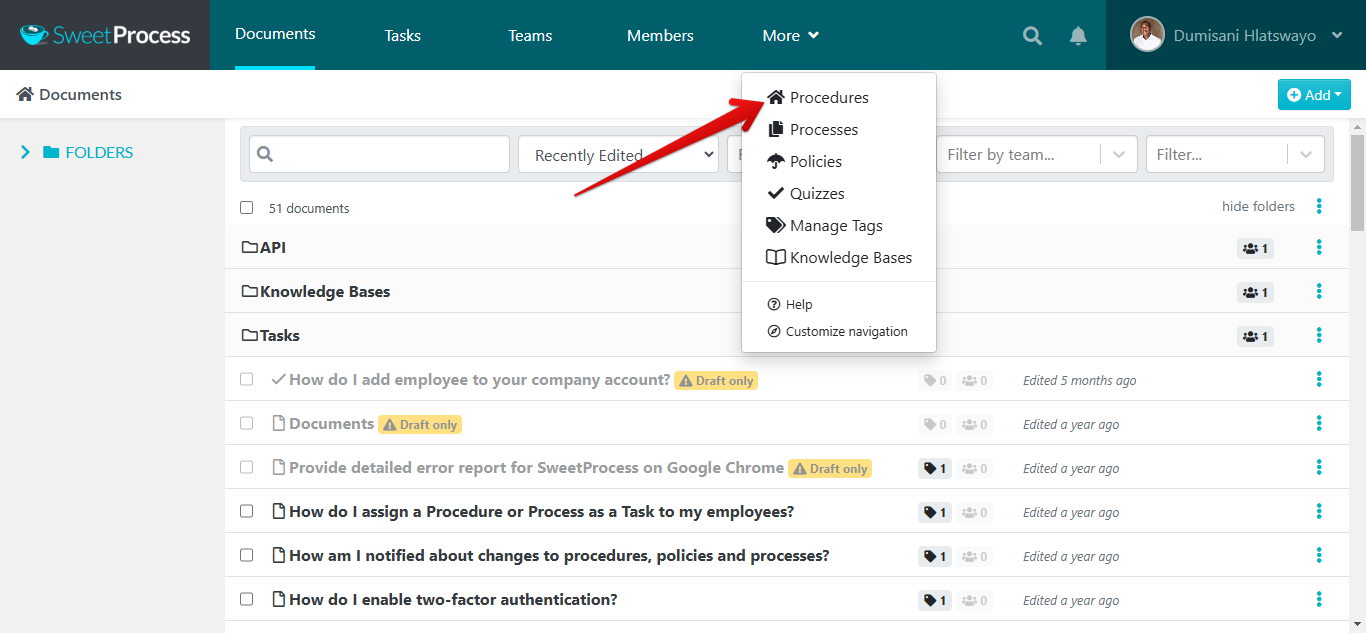
Still unsure? No problem—just follow these simple steps:
Click on the “Create Procedure” option from the available tabs.

Give your procedure a title.
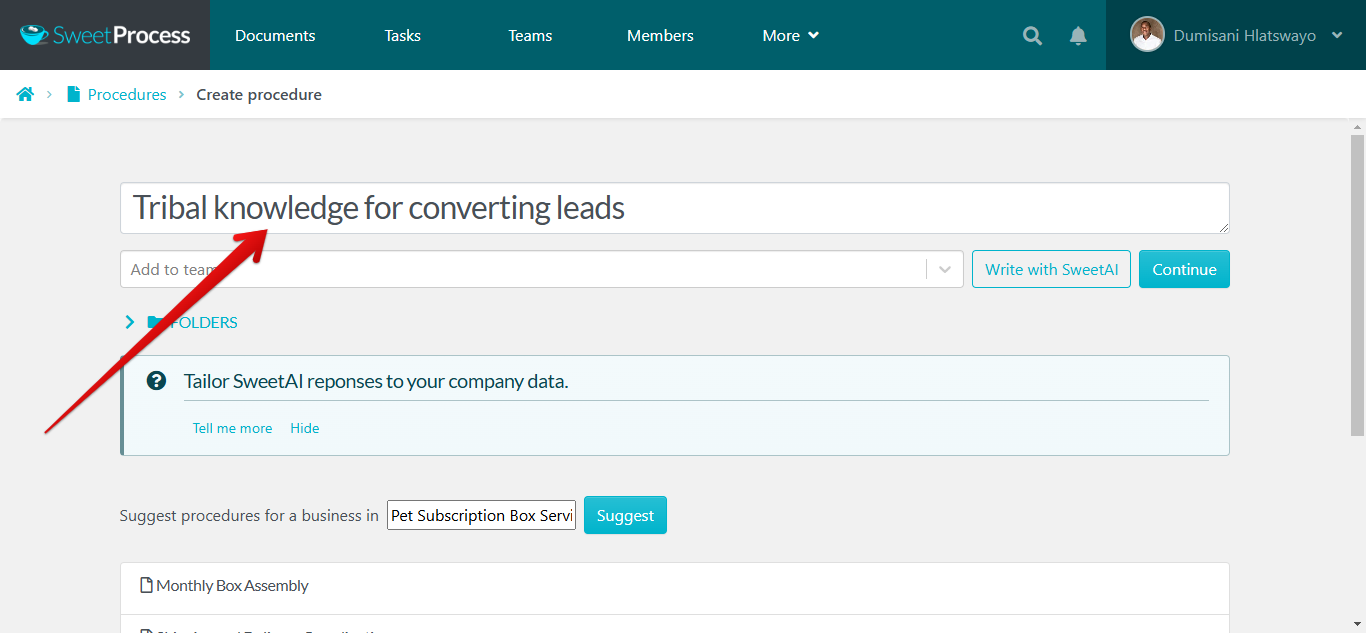
Click “Add to Teams” to assign the procedure to a specific team. Once assigned, your tribal knowledge will be accessible exclusively to that team. You can choose whether to allow your team to make edits or add new information. The great news is that you can always track any changes made to the procedures, ensuring complete visibility and control.
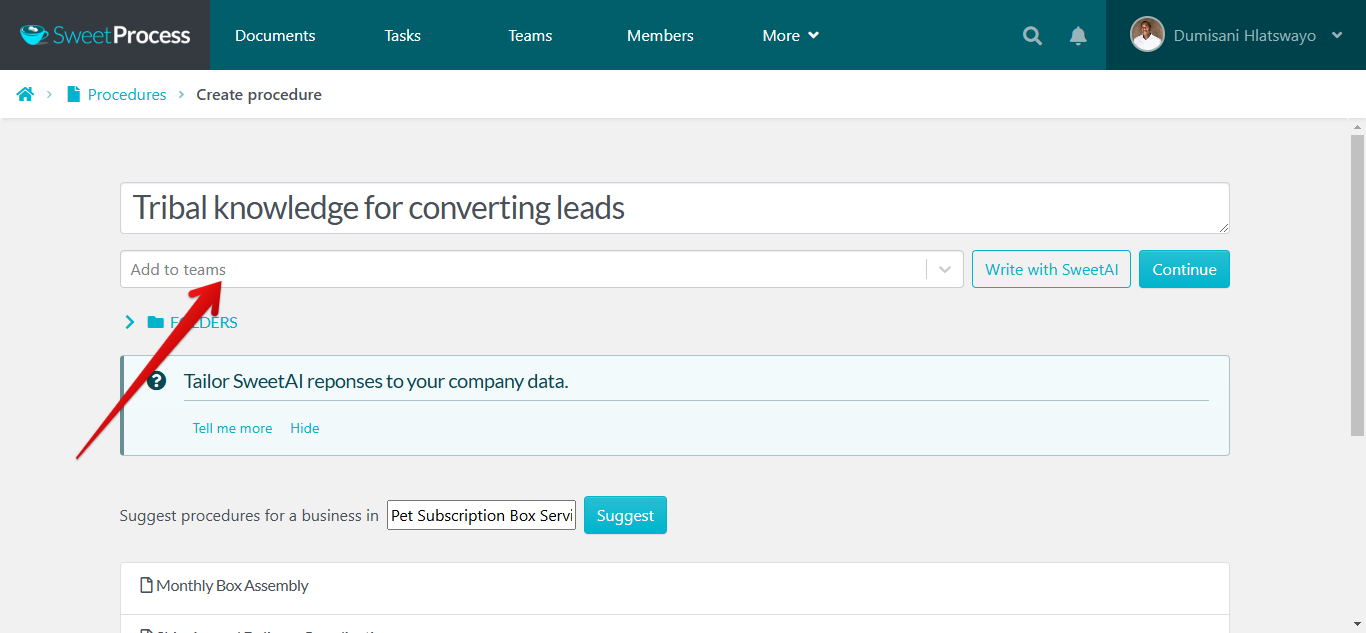
Turn Existing Procedures and Policies Into a Knowledge Base for Employees
One of the best features of SweetProcess is the ability to turn an existing procedure or policy into a knowledge base. You can create one or multiple knowledge bases to suit your needs. For example, each department can have its dedicated knowledge base, or you can opt to have a knowledge base for your team and another for your clients. This flexibility allows you to organize and share information in a way that best supports your business.
Here is how to turn your procedures and policies into a knowledge base.
First and foremost, navigate to the “More” column on your dashboard and click on the “Knowledge Bases” tab.

Once you click on the “Knowledge Bases” tab, SweetProcess will redirect you to a new page like this:
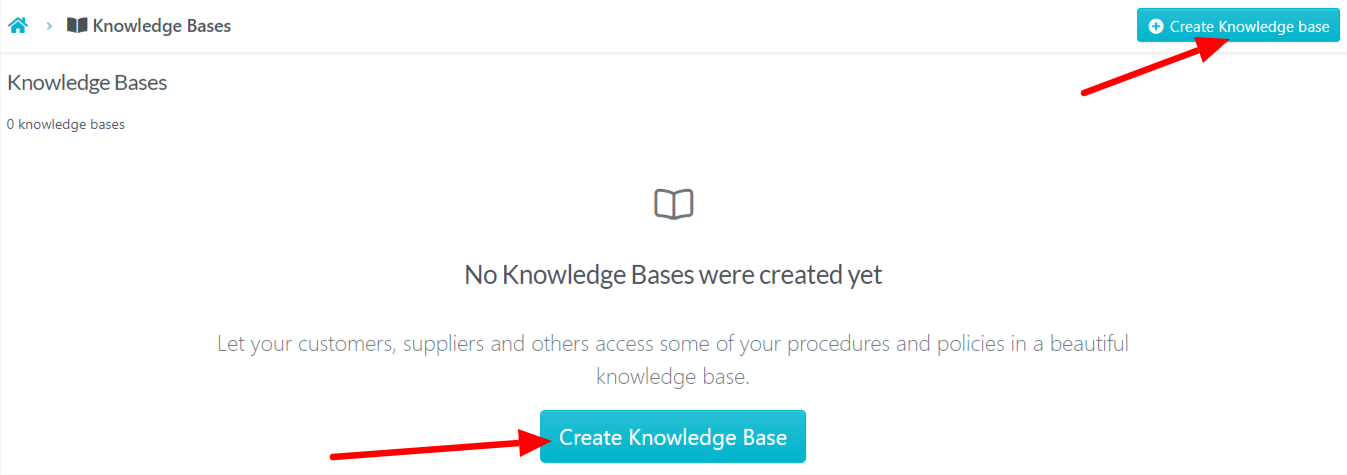
Next step, you’ll need to name your knowledge base. You can give it a title like the one shown below: In this example, we’ve titled it “SweetProcess Knowledge Base.”

Once done, you’ll have an option to set your knowledge base private or public.
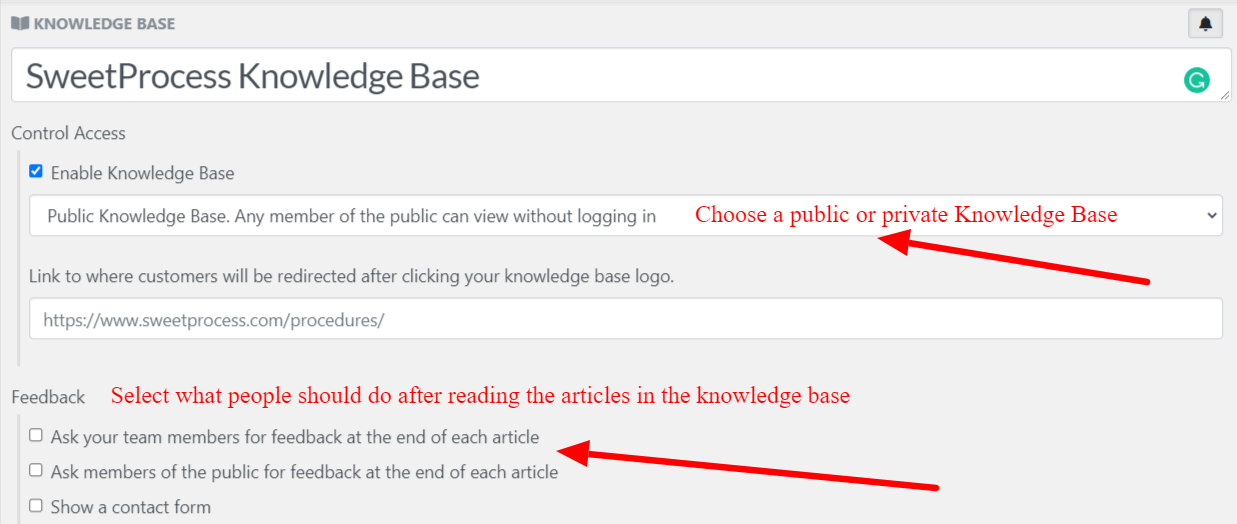
From there, you can name the categories for each knowledge base.

There’s no limit to the number of categories you can create. SweetProcess allows you to add as many as you need. Also, you can include subcategories within a category. For instance, you could create a category for Tribal Knowledge for Managing Employees and then add a subcategory like Time Management for Employees.
To add procedures or policies to a category, click on the desired document. SweetProcess will then prompt you to select the procedure or policy you want to add as an article.
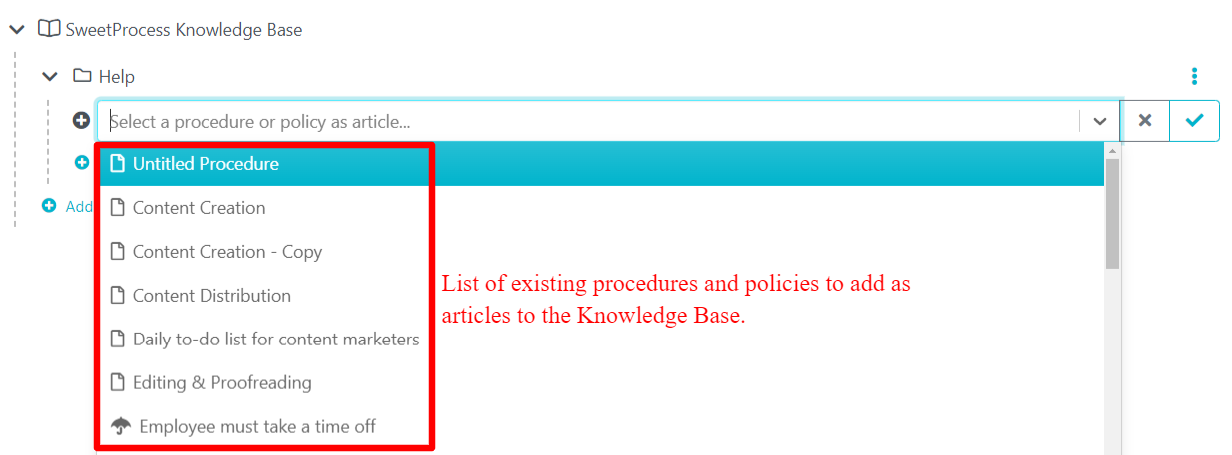
After adding the policies and procedures to the knowledge base, it will look something like this:
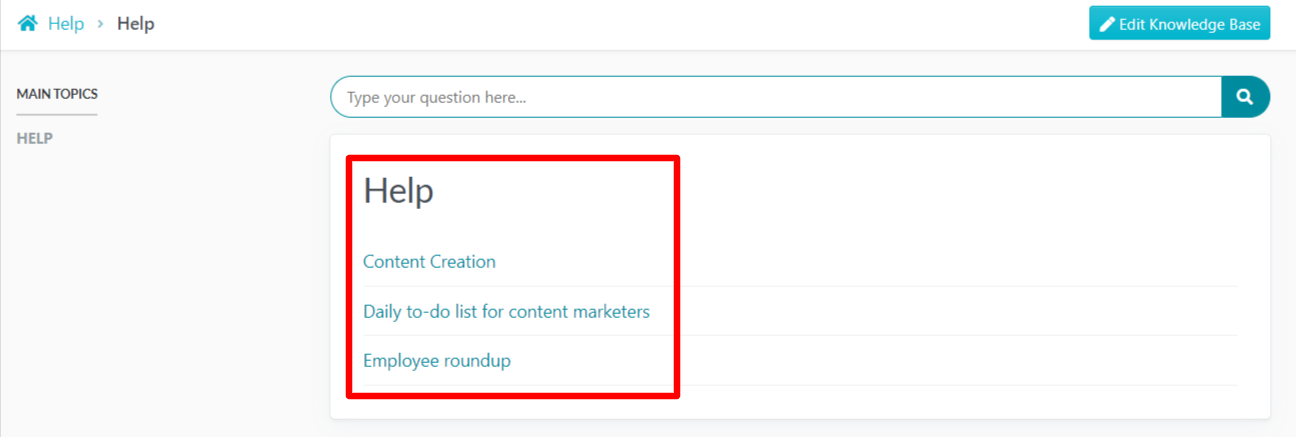
Finding documents will be quick and straightforward, thanks to the search functionality that allows you to locate documents within seconds.
Build a Quiz to Assess Your Team’s Grasp of Company Policies, Processes, and Procedures
You can also use SweetProcess to create a quiz, which can be an excellent way to assess your employees’ understanding of your policies, procedures, or processes. It can also help you evaluate whether your newly hired employees have grasped the tribal knowledge you’ve documented.
To get started, navigate to the “More” column, then select “Quizzes.”
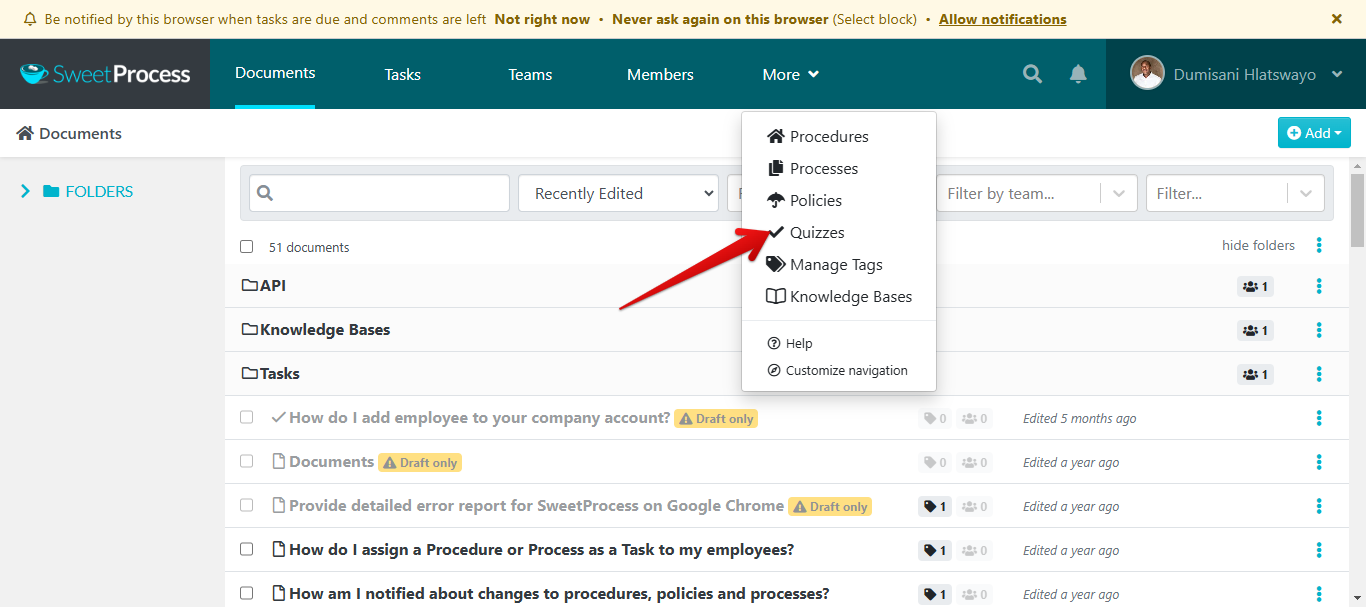
From there, click on the “Create Quiz” tab. Once you click on it, you’re all set to begin creating multiple-choice questions.
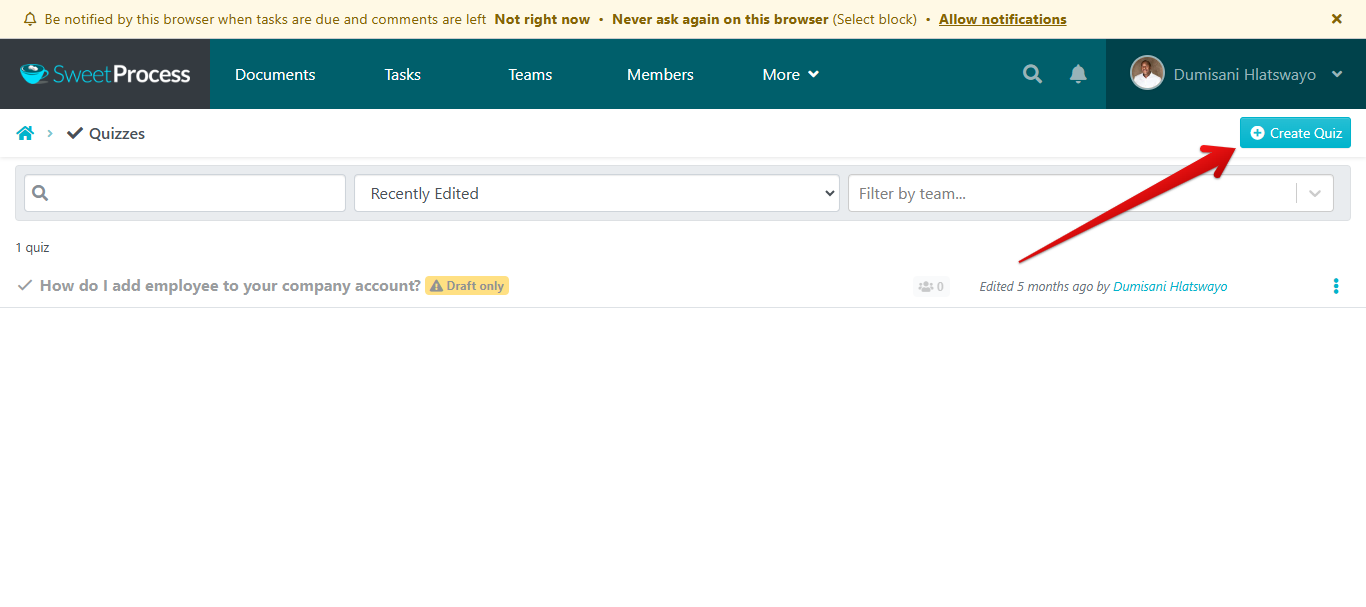
Turn Procedures and Processes Into Actionable Tasks
Remarkably, SweetProcess allows you to turn procedures and processes into actionable tasks. For example, you can assign a procedure to a team member, and they will immediately receive a notification in their inbox.
To assign a procedure as a task:
- Navigate to the “Procedures” tab on your dashboard.
- Select the procedure you’d like to assign.
- On the far right, click the three dots.
- Choose “Assign” and assign it to your team member.
This makes task delegation seamless and efficient!

Once you click the three dots, you’ll see the “Assign as Task” option.
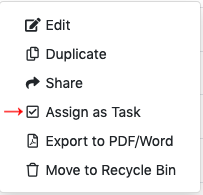
To assign a procedure or process as a task, use the “Assign as Task” option located in the “Actions” menu at the top-right corner of the screen while viewing the procedure or process.
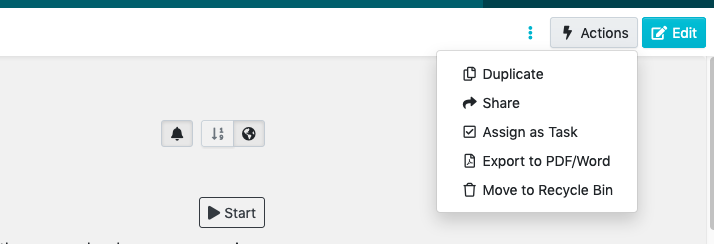
Assign Tasks and Collaborate With Team Members
SweetProcess allows you to assign tasks and collaborate seamlessly with your team members. This feature is an excellent way to track changes made by a team member while capturing new tribal knowledge. It ensures you can review everything for accuracy and confirm it’s documented in an easy-to-implement way.
Once you assign a task—or a task is assigned to you—you’ll receive notifications when it’s overdue or completed. Additionally, you’ll have the option to attach a form your employees can fill out as they complete the task, further streamlining the process.
Below are examples of companies that have used SweetProcess to capture tribal knowledge and standardize its processes.
Zen Media
Thousands of companies have improved productivity and consistently improved their employees’ performance by creating a standard knowledge base. This central hub is accessible to internal staff, allowing seasoned employees to document and share their expertise.
One such example is Zen Media, a company that stands out for maintaining consistent employee performance by establishing a knowledge base using SweetProcess.
Stephanie Chavez was looking for innovative solutions to enhance operations at Zen Media. As Chief Marketing Officer, she needed her team to align on processes, procedures, and policies. When she assumed her role, employees were left to manage their own workflows, leading to disorganization and a lack of uniformity.
American flat
Recognizing the importance of a structured approach, Stephanie sought a solution to streamline workflows and foster teamwork. That’s when an SOP software like SweetProcess proved invaluable, providing the structure Zen Media needed to achieve its goals effectively.
Another great example is Americanflat, an interior decoration company known for its stylish and exclusive designs. Its president, Giorgio Piccoli, has always been passionate about interior design. His struggle to find affordable wall art when he moved to New York inspired him to start a business with a mission to provide high-quality wall art at accessible prices.
Giorgio understood that growing a business relies on streamlining operations. Determined to achieve this, he began searching for the right SOP software and discovered SweetProcess, which offered the perfect workflow for his needs. Since adopting SweetProcess, Americanflat has significantly enhanced its business operations.
Benefits of Capturing Tribal Knowledge in a Company
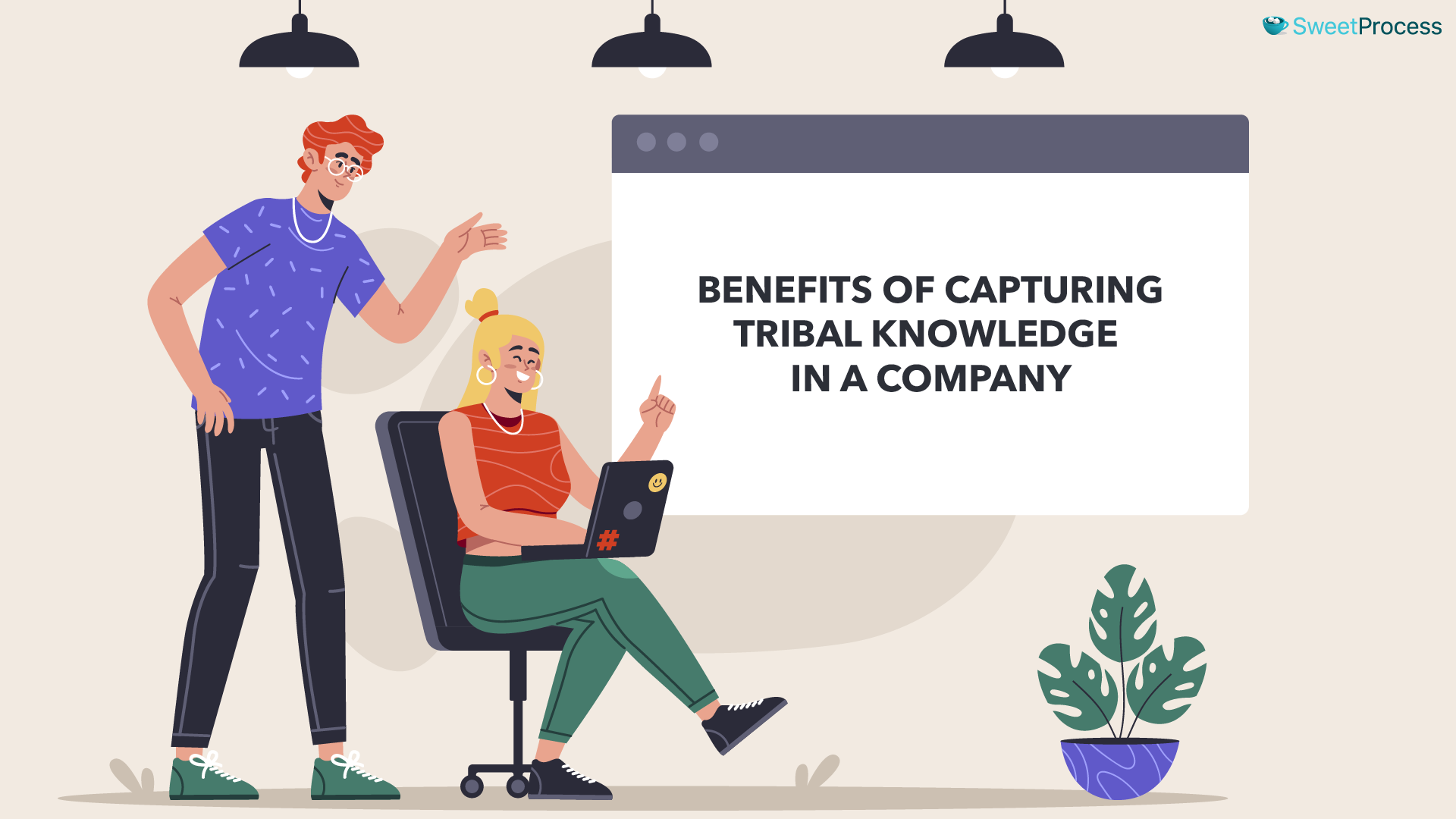
Enhanced Competitive Edge
One key benefit of capturing tribal knowledge is that it gives your organization a competitive edge. Your best employees can document their expertise and share it with the rest of your team. When everyone applies this knowledge to solve problems and serve customers, you’ll see a significant improvement in productivity. Your existing customers will be satisfied and more likely to recommend your business.
If your competitors are not documenting their tribal knowledge, this gives you an even greater advantage. You’ll be in the best position to serve your customers more effectively than your competitors can.
Preserve Company Knowledge
What better way to document the tribal knowledge of a knowledgeable employee than by writing it down? Every year, hundreds or even thousands of highly experienced employees retire.
For example, in 2022 alone, individuals aged 70–74 were required to retire in the United States. Many left with a wealth of knowledge that could help grow your business. Recording their tribal knowledge is the best way to preserve this valuable resource for the future.
Increased Efficiency and Productivity
Documenting tribal knowledge is one of the savvy ways to increase productivity in your company. By capturing the expertise of your A team members, you make their knowledge accessible to everyone. This ensures that new employees, interns, and even those who may be less competent can quickly learn and improve their performance.
Collaborative Culture
One of the greatest benefits of capturing tribal knowledge is its ability to nurture a collaborative culture. Preserving such wisdom encourages teamwork and creates an environment where employees feel empowered to share their expertise and work closely with one another. Even those who may not naturally gravitate toward collaboration are motivated to contribute.
Future-Proofing
You understand the value of experience, and that’s why documenting tribal knowledge is essential. By preserving your team’s wealth of expertise, practical know-how, and insights, you reduce dependency on key individuals. This protects your business from potential disruptions and streamlines onboarding and training. Newly hired employees will have access to well-documented tribal knowledge, enabling them to hit the ground running.
Drawbacks of Tribal Knowledge in an Organization

Ineffective Knowledge Sharing
A key drawback of tribal knowledge is that it’s often informal and undocumented. This makes it difficult for seasoned team members to share effectively across teams. Without proper documentation, your business may face inconsistencies and a lack of process clarity.
Hoarding Information Consciously or Unconsciously
Highly experienced employees might intentionally withhold their knowledge to maintain job security or fail to share it simply because they don’t realize its importance. Either way, this limits the flow of critical knowledge within your organization.
Knowledge Gaps in Training
Relying on tribal knowledge can lead to incomplete or outdated training for new hires. Without a structured approach, seasoned employees might default to using outdated tools or practices, leaving new team members unprepared for current business needs.
Bridge the knowledge gap in your organization with our tool. Sign up for a 14-day free trial to see it in action.
What Leads to Tribal Knowledge in the Workplace?

Every workplace gradually develops tribal knowledge, which your employees accumulate as they gain experience. Let’s explore some key factors that typically contribute to creating tribal knowledge.
Observation and Imitation
Employees often learn by observing their more experienced colleagues and then imitating their actions. For instance, by picking up on best practices, observing how they are effectively implemented and applying them under the guidance of seasoned colleagues. Eventually, your employees will refine their skills and contribute to the pool of tribal knowledge.
Problem-Solving
The more problems your employees solve, the better equipped they become at resolving similar issues. The strategies and approaches they develop become part of their tribal knowledge, often known only to them until shared with others.
Informal Interactions
Tribal knowledge is sometimes passed down through casual interactions. For example, a new employee may learn precious knowledge from an experienced colleague during a relaxed conversation, such as at lunch or by the coffee machine.
Experiences and Lessons
Employees accumulate tribal knowledge through successes and failures. The more they encounter objections or challenges, the more they learn and refine their approach. These lessons become part of the tribal knowledge shaping their actions and decisions.
Tribal Knowledge vs. Institutional Knowledge: How Do They Differ?

Most people often confuse tribal knowledge with institutional knowledge, but they are distinct. They differ in how they are created, shared, and applied. Let’s take a closer look at each.
Institutional Knowledge
Institutional Knowledge is a formalized and organized body of knowledge within your company. Examples of institutional knowledge include processes, procedures, policies, and best practices. We refer to them as institutional knowledge because they are systematically recorded and shared across the organization.
Tribal Knowledge
Tribal knowledge is informal and typically undocumented. It’s the knowledge that employees accumulate over time through experience. Often, tribal knowledge is passed down through imitation, observation, and casual interactions between colleagues.
| Tribal Knowledge | Institutional Knowledge |
| Informal, unwritten knowledge passed through experience | Formal, documented knowledge within the organization |
| Gained through individual experience, observation, and imitation | Derived from formal systems, policies, procedures, and training |
| Often difficult to access and may be limited to specific individuals | Easily accessible, typically stored in centralized systems |
| Harder to transfer, often implicit and shared informally | Easier to transfer, well-documented, and systematic |
| Flexible and adaptable but risks loss if key employees leave | Ensures consistency and continuity, reducing risk of knowledge loss |
Tribal Knowledge vs. Other Company Knowledge

Tribal Knowledge vs. Explicit Knowledge
Tribal knowledge is informal, often undocumented, and typically shared through personal experiences, observations, and employee interactions. It is built up over time and may reside in individuals’ minds.
Explicit Knowledge
Explicit knowledge, on the other hand, is formal, systematic, and well-documented. It can be easily written down and shared through manuals, databases, reports, and training materials. Explicit knowledge is structured and can be transferred through clear instructions, policies, and guidelines, making it more accessible and easily transferable across an organization.
| Tribal Knowledge | Explicit |
| Informal, undocumented knowledge passed through experience | Formal, documented knowledge stored in manuals or systems |
| Rarely documented, shared informally | Easily accessible to all within the organization |
| Limited to specific individuals or groups | Easy to transfer through training materials or instructions |
| Hard to transfer, relies on mentorship or informal sharing | Structured, objective, and standardized |
| May vary in accuracy or be outdated | Consistent, reliable, and regularly updated |
Implicit Knowledge
Implicit knowledge is the knowledge that an individual knows but may be unable to explain or document easily. It is more intuitive and based on experience, but unlike tribal knowledge, it is not necessarily shared within a group. It exists in the mind of the individual, often as a subconscious understanding or tacit knowledge, but it is difficult to articulate without practice or reflection.
| Tribal Knowledge | Implicit |
| Informal, undocumented knowledge passed through experience | Intuitive, subconscious knowledge held by individuals |
| Rarely documented, shared informally | Rarely shared, as it is internal and difficult to articulate |
| Limited to specific individuals or groups | Difficult to document due to its subconscious nature |
| Hard to transfer, relies on mentorship or informal sharing | Typically limited to the individual who possesses it |
| May vary in accuracy or be outdated | Personal, instinctive, and learned through doing |
Is Tribal Knowledge Offensive?
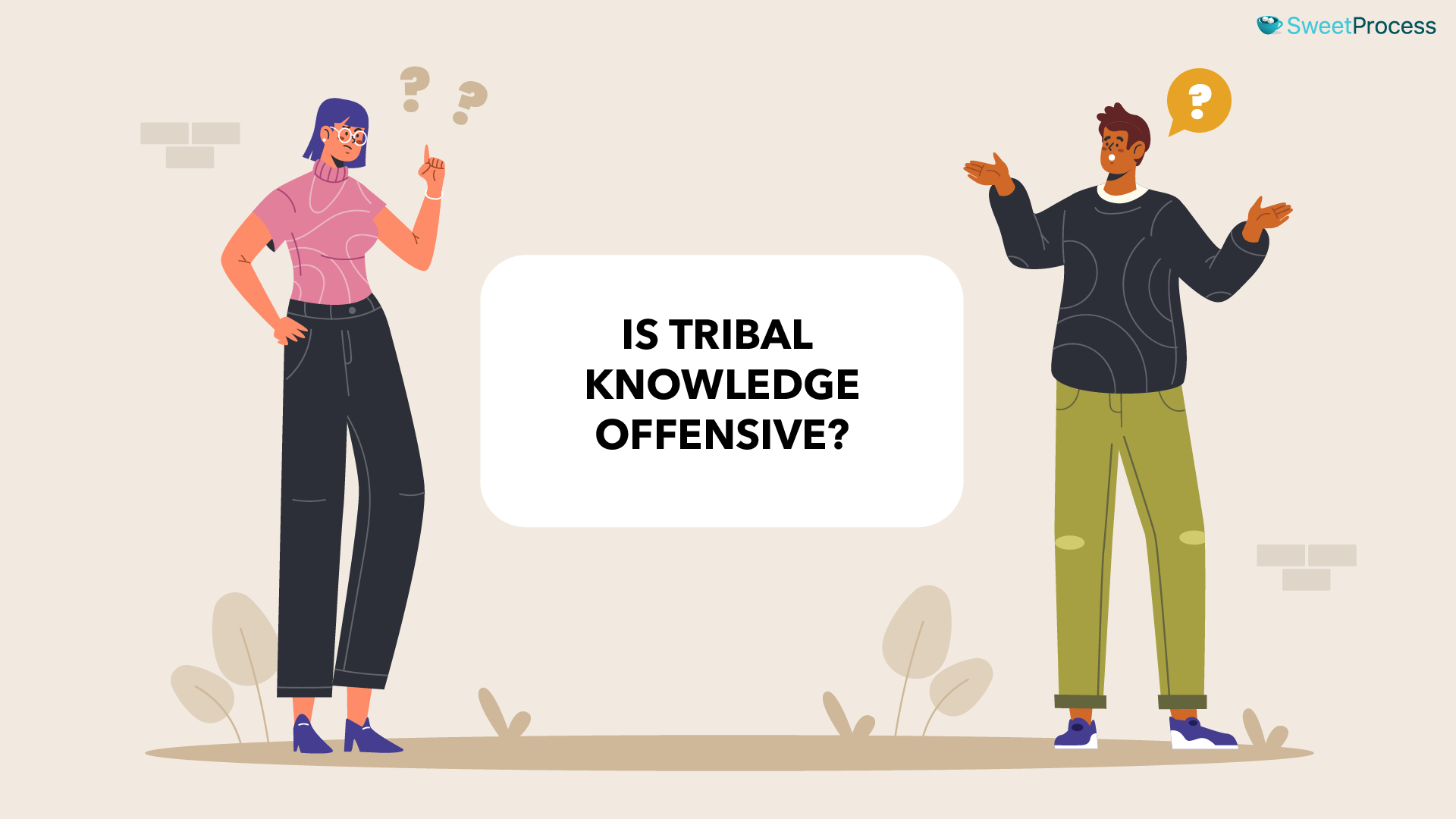
At first glance, the term tribal knowledge might seem to carry a derogatory connotation, but it doesn’t. In a business context, tribal knowledge refers to the collective wisdom, skills, and processes that team members develop and share informally. It’s the lifeblood of competency and efficiency in many organizations.
Rather than dismissing it, start recognizing tribal knowledge as a valuable asset for your business. This knowledge can help solve problems faster and even give you a competitive edge. The key is to document it, ensuring your day-to-day operations run more smoothly and effectively.
To maximize its impact, make sure tribal knowledge isn’t scattered. Safely store it in an organized, accessible way so employees can easily find the information they need when they need it.
Start Documenting Tribal Knowledge Today!
Document and Manage Your Company’s Tribal Knowledge Using SweetProcess
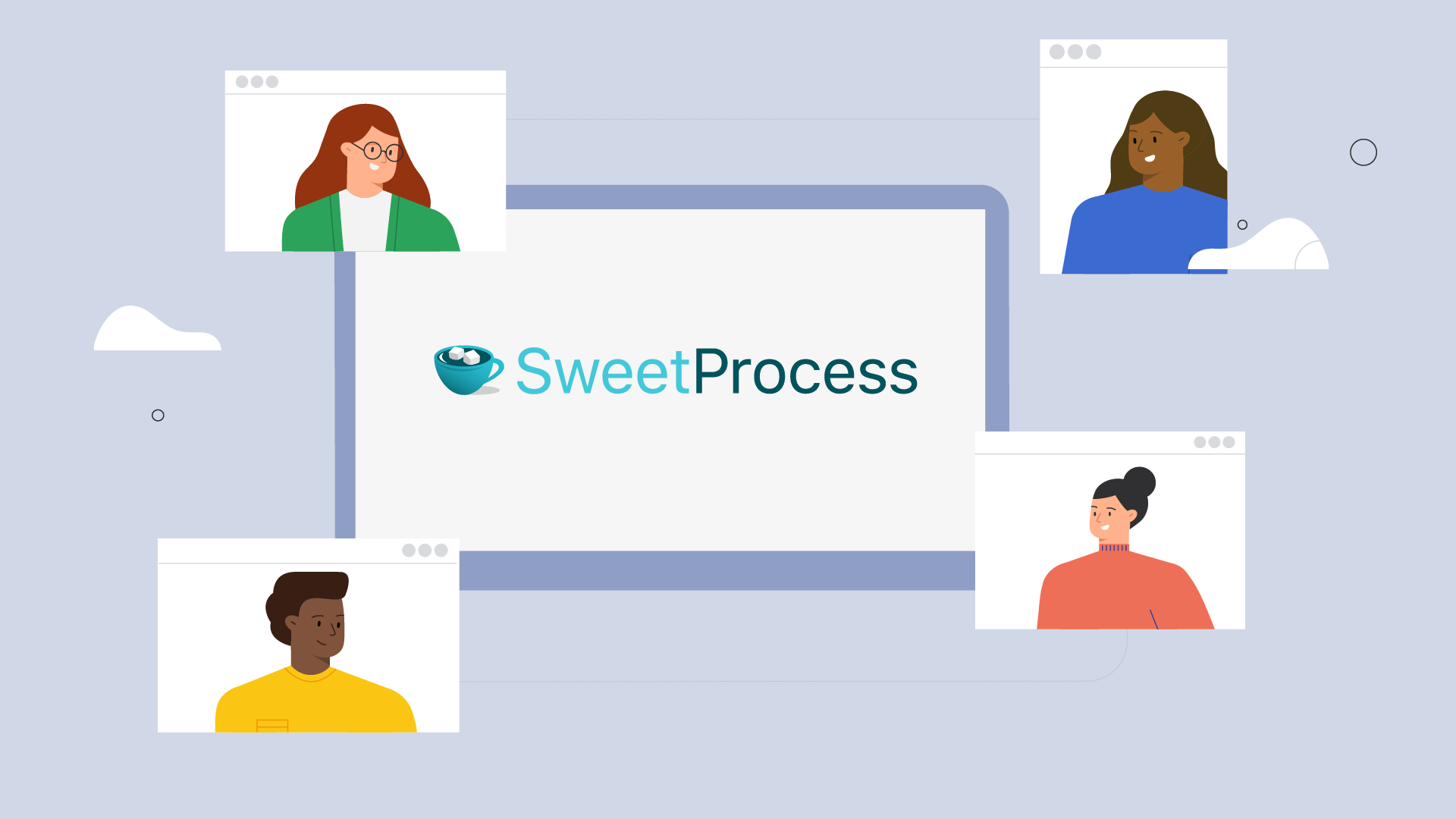
Don’t wait to introduce a tradition of documentation within your team. The best way to begin?
Create structured, accessible records that prevent the loss of critical information due to employee turnover or organizational growth.
And that’s where a tool such as SweetProcess shines. SweetProcess simplifies the process of documenting tribal knowledge into SOPs. With its intuitive interface, teams can effortlessly record, store, and update critical information. This not only preserves valuable insights but also ensures consistency and scalability.
Imagine a workplace where every team member knows exactly what to do, how to do it, and why it matters. That’s the transformative power of turning tribal knowledge into shared organizational wisdom. Sign up for a free trial of SweetProcess today; no credit card required.
